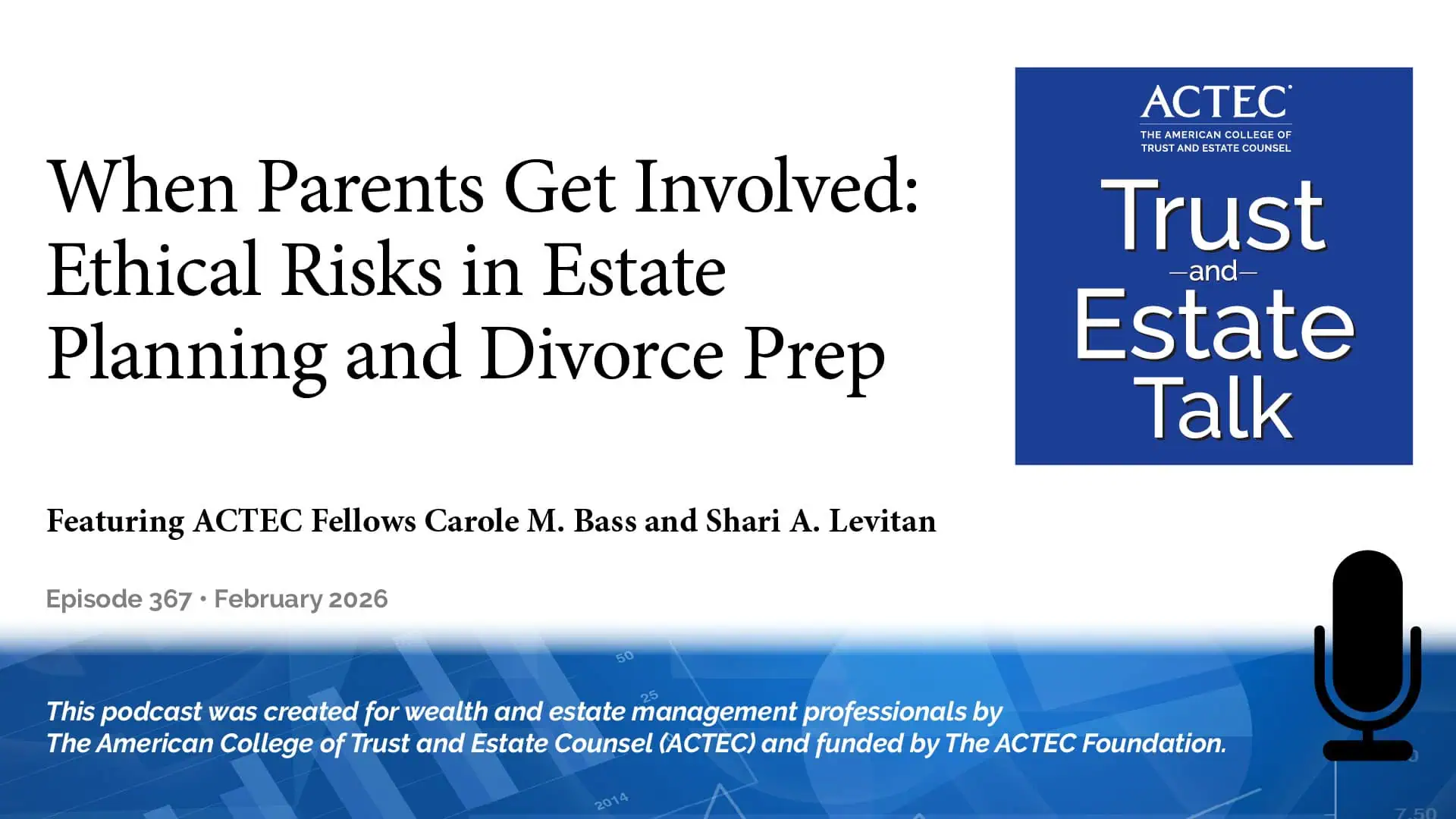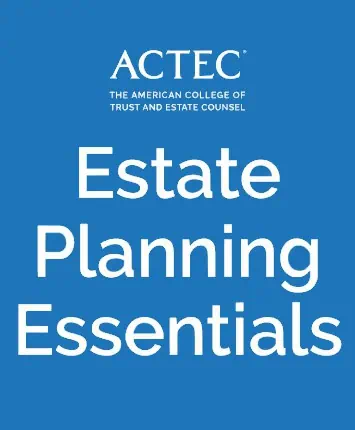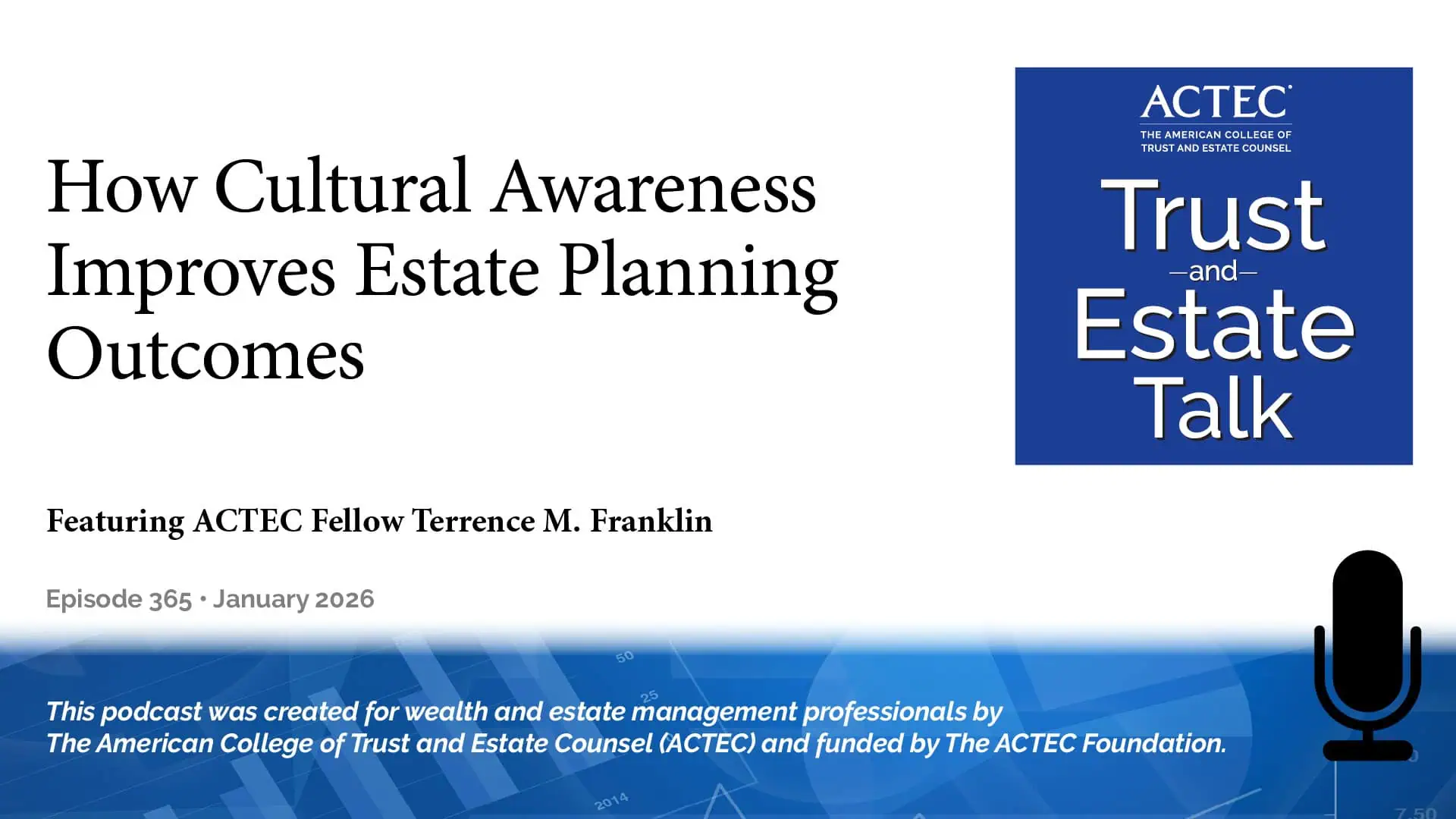Modifying Trusts after CCA 202352018
“Modifying Trusts after CCA 202352018,” that is the subject of today’s ACTEC Trust and Estate Talk.
Transcript/Show Notes
This is Margaret Van Houten, ACTEC Fellow from West Des Moines, Iowa. IRS Chief Counsel Advice 202352018 was released at the end of 2023. It rules that a beneficiary would be making a taxable gift by consenting or acquiescing to a trust modification. ACTEC Fellow Steve Gorin from St. Louis, Missouri, is with us today to discuss the CCA’s true scope, how it affects designing trusts when drafting, and some considerations when modifying trusts. Welcome, Steve.
Steve Gorin: Thank you, Margaret. Glad to be here with you. The CCA is a shot across the bow. We know that estate planning clients can never be happy with whatever trusts are ever created. There’s always buyer’s remorse, or down the road, circumstances change trusts need to be modified for one reason or another- particularly in the age of perpetual trusts. So, what are you going to do when a trust needs to have something happen to it to make it more and more workable arrangement? And that will wind up being a trust modification of some sort.
Trust Modifications
Lots of different ways to do trust modifications, whether it’s decanting or the trust protector or some other method. Now, the IRS basically says if you’re going to change a beneficial interest in a trust, then there are gift tax consequences. But they don’t define what those gift tax consequences are. In fact, in a Private Letter Ruling several years ago, the beneficiary exercised a power of appointment, an inter vivos one. So some assets were leaving the trust and the IRS said, well, you know, some assets are leaving the trust. And it could be that there’s so many assets left on the trust that it really didn’t affect the beneficiary to have those assets leave the trust. So maybe that was a gift with a nominal value, but it’s still a gift.
So this CCA is really nothing new in terms of it’s really just going with the IRS as long-standing position that a change in the beneficial interest has some gift tax potential. And if you have a beneficiary who affirmatively consents, which was really the so-called facts of the CCA, then you’re definitely having some kind of a release.
Ascertainable Standard
We know a release and a lapse are a little bit different for gift tax purposes and particularly, if a beneficiary doesn’t take an action, does it really mean that the beneficiary is taking some kind of affirmative decision making? The beneficiary may not even understand what’s going on, or the beneficiary might feel is it’s just not worth it to challenge what’s going on. So, it really kind of proves too much to say, well, if a beneficiary refuses to object, just doesn’t object at all, that they’re making a gift. The CCA cites a particular Regulation 25.2511-1(g)(1), when it’s saying that there’s some kind of gift tax consequences when anything happens with the trust. What it doesn’t do is mention the paragraph that immediately follows that Regulation 25.2511-1(g)(2). In that regulation, the trustee is a beneficiary and has ascertainable standards for distributions to that trustee beneficiary and to other beneficiaries. And under that regulation, when the trustee beneficiary makes a distribution to other beneficiaries, that beneficiary is not making a gift. So you have this regulation that says money is leaving the trust — is going to somebody other than the other than the beneficiary who’s basically making the decision for that money to leave the trust — and yet, there is no gift. So why is that? That’s because there’s an “ascertainable standard” there, and an ascertainable standard is something that a beneficiary has legal rights to try to enforce.
Now, it can be difficult to enforce those legal rights in terms of you got to prove the abuse of discretion. But nevertheless, here we have that there are some legal rights that are at stake here. And the other beneficiaries do have rights. And those have to be considered. And just the fact that the money leaves the trust doesn’t mean that that beneficiary- who’s the trustee- should sue himself or herself for letting money leave the trust. The trustees actually was very much authorized. You might even say it was almost required- you know, it is still discretionary, so it’s not totally required- but ascertainable standard, you know, does it is an enforceable thing.
So, the bottom line is that the regulations don’t support kind of a chicken little thing that says anytime anything happens with the trust, that there is a gift going on, you have to look to see what the beneficiary’s rights were, and how strong they were. And if the rights were very little for the beneficiary to resist the trustee’s actions, then the beneficiary does not have a duty to sue. And there’s no gift tax consequences to doing that.
Considerations When Designing a Trust
When you design trusts and you’re drafting a trust and you know that things are going to happen over time, and the trust may need to be modified, it’s good to have things that are clearly within the trustee’s purview. You might have some kind of a power of appointment, you might have a trust protector, you might also just have the trustee being able to make distributions in the trustee’s sole and absolute discretion without any standards. Because when you have such broad latitude by the trustee, it’s really difficult for any beneficiary to argue that the trustee was doing something wrong when they exercised that very, very broad power.
The idea here is to attenuate the beneficiary’s rights to make it more speculative for a beneficiary to maybe successfully mount a challenge and then the IRS has a much more difficult time saying that the beneficiary should have mounted a challenge.
And then when you go to modify the trust, you know, the beneficiary has a potential cause of action, what is the scope of that cause of action — is it going to be big or little? Well, in the Uniform Trust Code states, which are the majority of them, the trustee can be sued throughout the trust entire trust administration, up to five years after termination of trusteeship or the trust, unless the trustee provides a notice to the beneficiary with a specified time period. Typically, that’s one year, but different states have different time periods. And if the trustee provides a sufficient notice to the beneficiary, the beneficiary has only a limited amount of time to object.
If you provide that notice, then you can cut off the beneficiary’s time to object. And the sooner you cut off those rights, the smaller the lawsuit might be. Because if you let things fester and compound over decades, then it can be a much bigger lawsuit that gives the IRS a much better position that there is some big consequence.
Final Recommendations When Modifying a Trust
I would recommend if you are going to modify a trust, do whatever notice is required to get the statute of limitations running so that we can cut off the gift at whatever the smallest level might be. So, I hope this helps you in drafting and administering trusts and look forward to perhaps talking with you further about it some other time.
Margaret Van Houten: Thank you, Steve, for updating us about this important ruling.
Additional Resources
- Estate Planning in 2024 (May 2024)
- The IRS Ruling on Modifying a Grantor Trust (Apr 2024)
Latest ACTEC Trust and Estate Talk Podcasts

Estate Planning Considerations in Community Property States Relating to Retirement Accounts
Explore how community property laws shape IRAs, 401(k)s, beneficiary designations, and spousal rights in retirement account estate planning.

When Parents Get Involved: Ethical Risks in Estate Planning and Divorce Prep
When parents join prenup or divorce planning, ethical risks follow. ACTEC Fellows explore privilege, conflicts, and protecting the attorney-client relationship.

Useful But Overlooked Trusts: A Planner’s Guide to When and How to Use Them
Explore overlooked trusts—including HEETs, alimony, voting, and blind trusts—and when estate planners should use them to address complex client needs.



